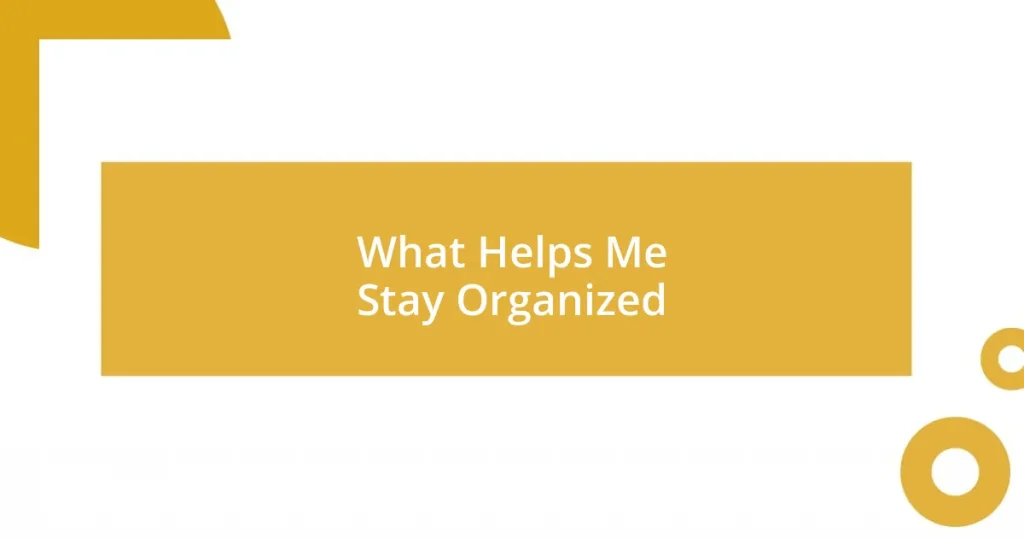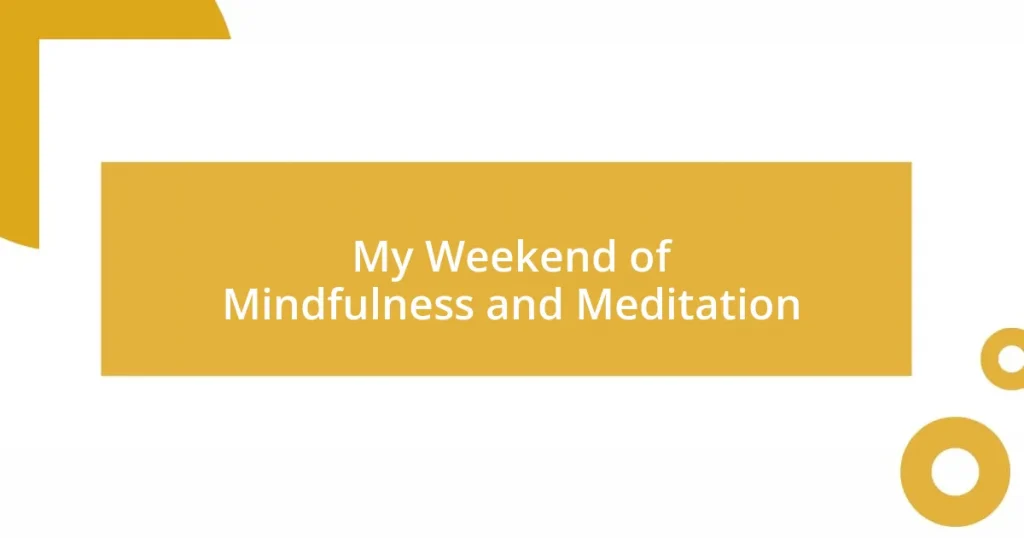Key takeaways:
- Organization improves productivity and mental clarity, transforming chaotic environments into structured, focused spaces.
- Utilizing time management techniques like time blocking and the Pomodoro Technique enhances focus and reduces distractions.
- Creating a flexible daily routine helps manage tasks effectively while allowing for necessary adjustments.
- Regularly reviewing and adjusting organizational systems fosters continuous improvement and better productivity.
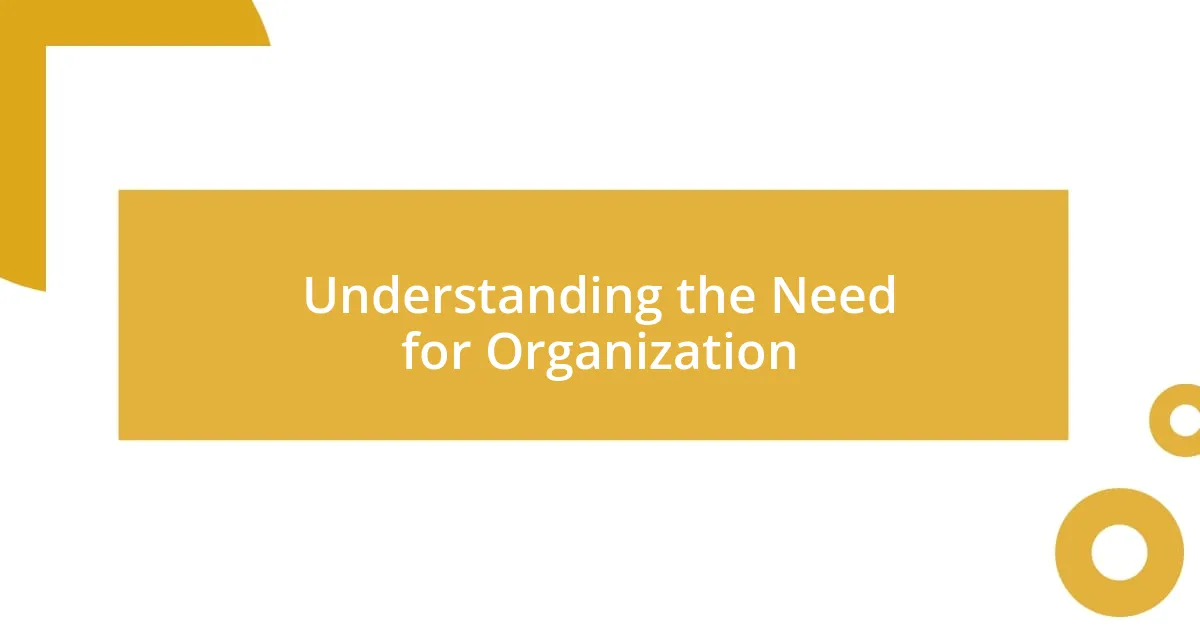
Understanding the Need for Organization
Organization is more than just keeping things tidy; it’s about creating a mental space that fosters productivity. I remember a time when my desk was a chaotic mess of papers and gadgets. It was overwhelming, and I found myself wasting precious time searching for things. Have you ever felt that frustration? When everything has its place, not only does my stress diminish, but my focus sharpens, too.
Consider this: when life feels chaotic, organization acts as a grounding force. I often think of how much clearer my mind feels after decluttering my environment. It’s fascinating how a simple shift—like putting things back in their designated spot—can cultivate a sense of calm and control. Isn’t it incredible how much our surroundings can impact our mental state?
Moreover, the need for organization extends beyond our physical spaces; it permeates our time and tasks, too. I’ve learned that using planners or digital apps helps me visualize my responsibilities. When I can see my week laid out clearly, it alleviates that nagging anxiety about forgetting tasks. Don’t you find that planning your time can transform your productivity? In my experience, embracing organization has been a game-changer for both my mental clarity and overall well-being.
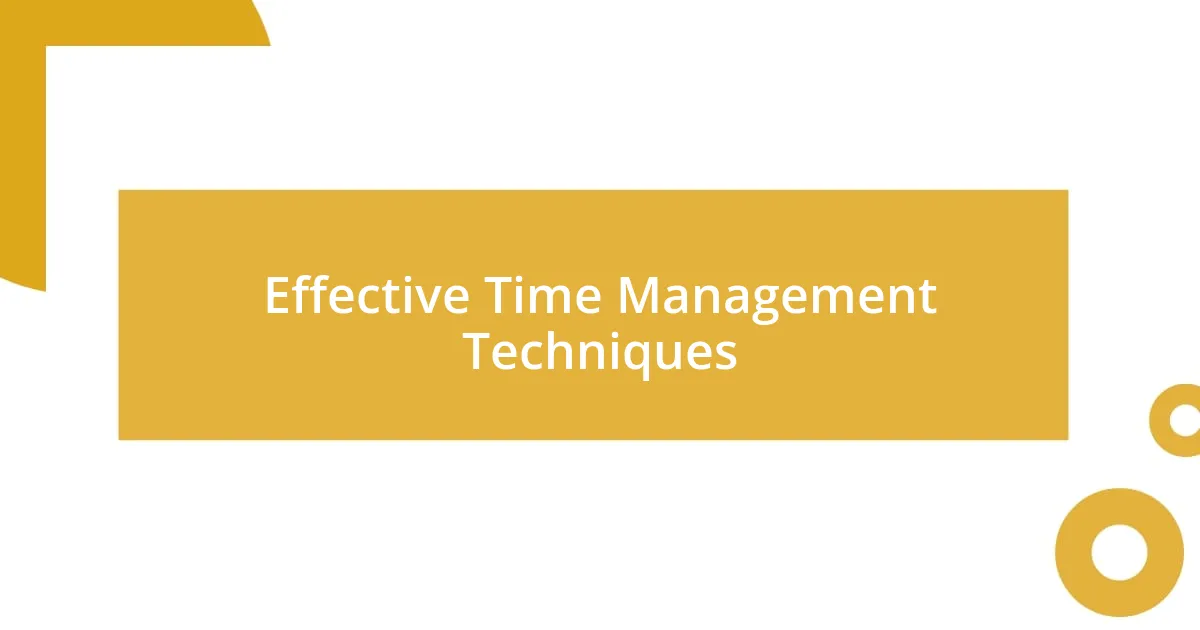
Effective Time Management Techniques
Effective time management has been a transformative aspect of my journey toward staying organized. For instance, I’ve discovered that blocking off specific times for tasks in my calendar helps me stay focused and less distracted. I remember one particularly hectic week when I decided to dedicate just two hours each morning to work on important projects without interruptions. That simple shift not only boosted my productivity but also allowed me to attain a level of focus I never thought possible.
Here are a few effective time management techniques that have worked wonders for me:
- Time Blocking: Allocating specific time slots for different activities.
- The Pomodoro Technique: Working in 25-minute bursts followed by short breaks to maintain concentration.
- Prioritization: Identifying and tackling the most important tasks first.
- Setting Deadlines: Creating self-imposed deadlines to enhance accountability.
- Reviewing Goals Weekly: Spending a few minutes each week to reflect on accomplishments and areas to improve.
Each of these methods has played a role in my quest for greater organization, helping me gain a clearer perspective on what truly matters in my day-to-day life.
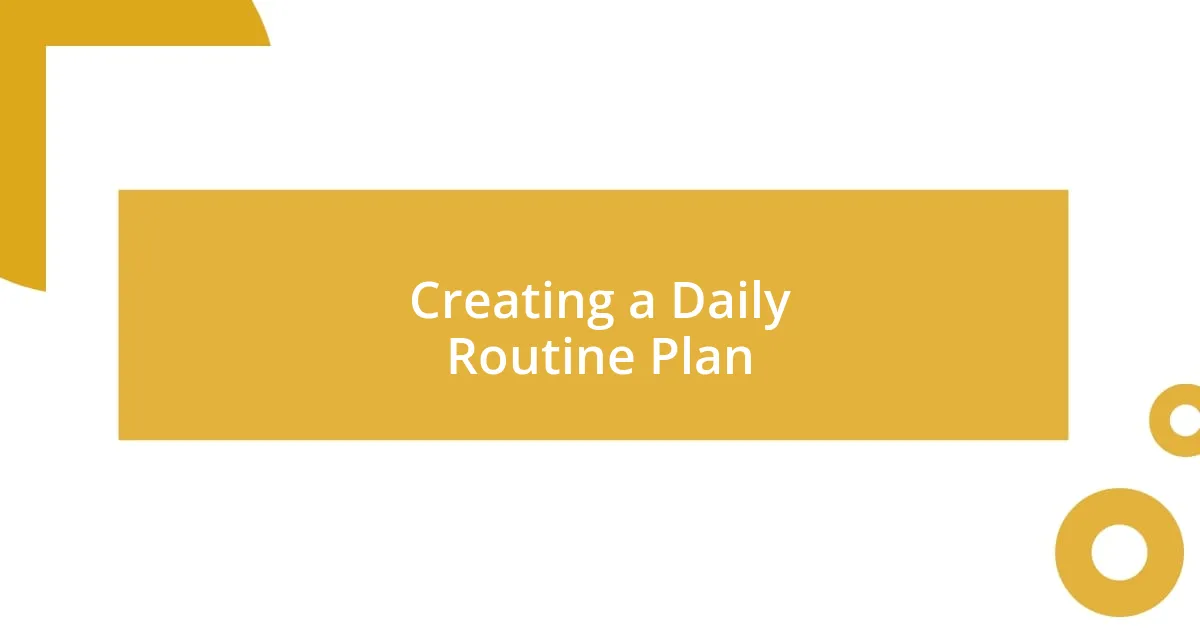
Creating a Daily Routine Plan
Creating a daily routine plan has been vital in my quest for organization. I often found myself overwhelmed by the countless tasks ahead. By designating specific time blocks for each activity, I noticed I completed my tasks more efficiently and with less stress. One particular morning, I laid out my day in chunks: a focused hour for emails, a few hours for project work, and dedicated time for breaks. That structure transformed my day from chaotic to manageable, making a profound difference in my productivity.
The beauty of a daily routine lies in its flexibility. While I cherish structure, I’ve learned that life happens, and it’s okay to adjust my plans when necessary. For instance, there was a day when an unexpected meeting popped up. Instead of feeling frustrated, I shifted my routine and ended up having a productive conversation that sparked new ideas. It was a lesson in adaptability—an essential trait for staying organized.
Another crucial aspect I’ve embraced is the evening review. At the end of each day, I take a moment to reflect on what I accomplished and what still needs my attention. This practice not only keeps me accountable but also allows me to express gratitude for the small wins. Have you ever felt that rush of satisfaction from ticking off completed tasks? It’s a simple yet powerful way to cultivate motivation for the days ahead.
| Routine Element | Description |
|---|---|
| Time Blocking | Setting specific hours for tasks to enhance focus. |
| Flexibility | Allowing adjustments to plans for unforeseen events. |
| Evening Review | Reflecting on accomplishments to maintain motivation. |
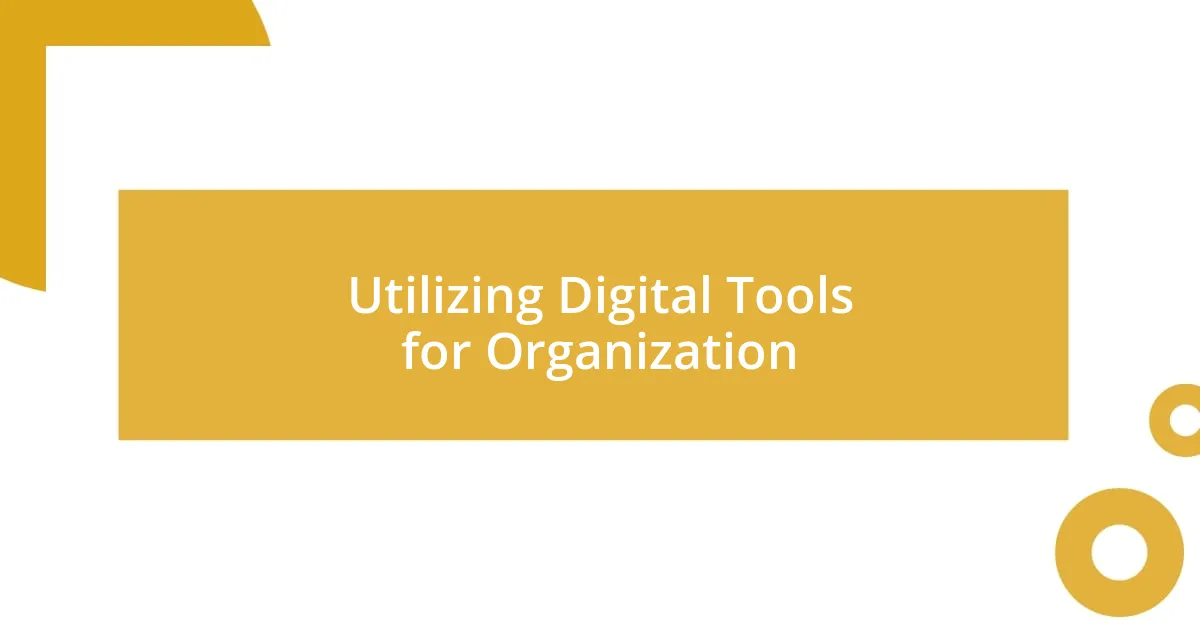
Utilizing Digital Tools for Organization
Utilizing digital tools has completely revolutionized my organization strategies. For example, I’ve found that using apps like Trello and Todoist helps me keep track of deadlines and tasks from all areas of my life in one place, which is incredibly liberating. Just the other day, I used Trello to map out a project, and seeing everything visually laid out allowed me to identify potential roadblocks before they became issues. Isn’t it fantastic how a simple digital board can bring clarity?
Another aspect of these tools is their ability to sync across devices. I often use Google Calendar to set reminders and schedule important tasks, which means I have access to my plans whether I’m on my laptop or smartphone. I recall an instance when I was away from my computer and got a reminder about an upcoming appointment. Without that instant notification on my phone, I might have missed it entirely, leading to chaos in my day. Don’t you think having that level of connectivity is essential in our fast-paced lives?
Lastly, I can’t emphasize enough how collaboration tools, like Slack or Microsoft Teams, have changed the way I communicate with colleagues. They’ve streamlined project discussions and reduced email clutter significantly. I remember feeling overwhelmed by a project because of constant email chains, but after switching to Slack, the conversations became more fluid and organized. It made me wonder—how did we ever manage without these tools? Overall, incorporating these digital solutions into my daily routine has helped me stay on track and truly embrace a more organized life.
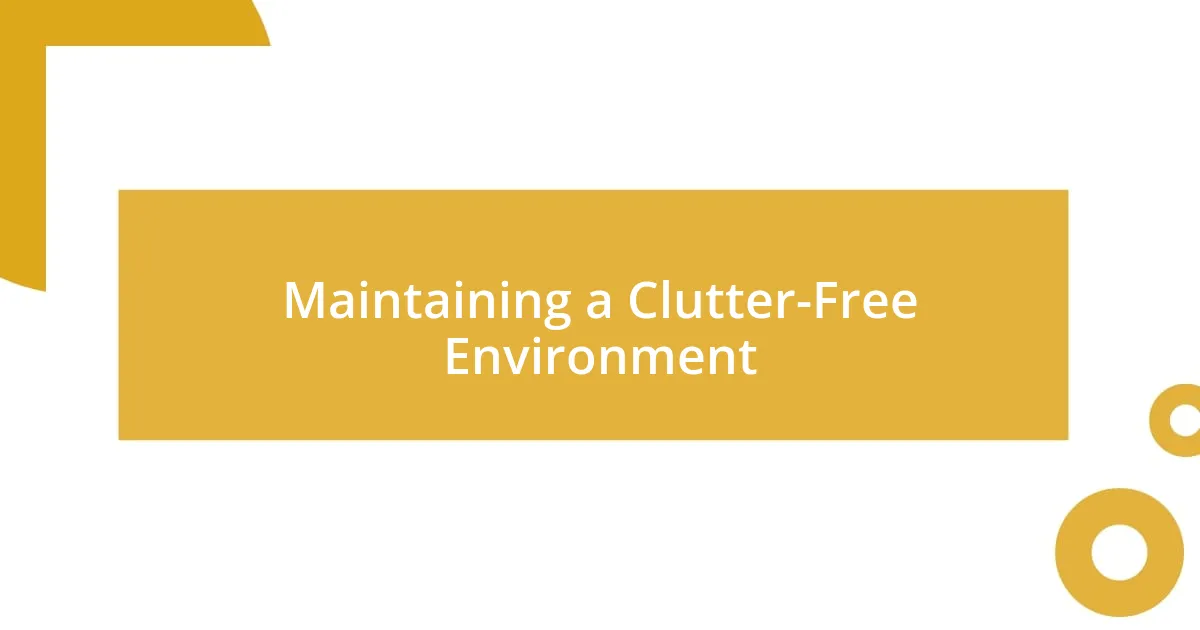
Maintaining a Clutter-Free Environment
Maintaining a clutter-free environment is an ongoing challenge that I’ve learned requires daily commitment. I remember the day I decided to tackle my overflowing bookshelf, which had turned into a chaotic mix of genres, forgotten reads, and papers I didn’t need. As I sorted through the items, letting go of books that no longer resonated with me initiated a sense of liberation. Have you ever felt lighter after decluttering? It’s a powerful realization that can significantly enhance your focus and clarity.
Creating dedicated spaces for items has been a game changer for me. I established a “home” for every necessity—like my keys, notebooks, and chargers. This strategy not only saves time but also prevents that familiar feeling of anxiety when I’m racing against the clock to find something. In fact, just last week, I made it a point to tidy my workspace before the weekend. The sight of a clean desk brought me peace and made returning on Monday much less daunting. It’s these small victories that can set a positive tone for the week ahead.
Another aspect I cherish is the practice of regular tidying, often inspired by the popular KonMari method. I allocate ten minutes at the end of each day to return things to their proper places. Initially, I thought it was a trivial task, but now I can’t imagine my routine without it. I often reflect on how that simple ritual creates a transition between work and relaxation, enabling me to truly unwind at the end of the day. Isn’t it fascinating how such little efforts can profoundly impact our mental state?
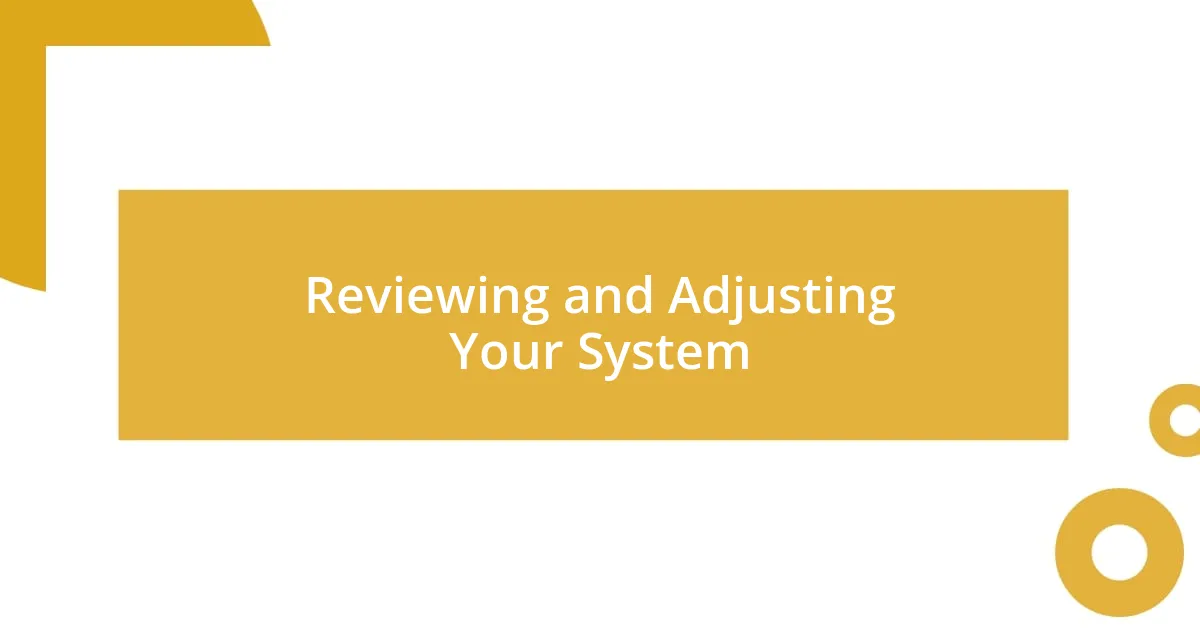
Reviewing and Adjusting Your System
Reviewing my organizational system is something I find crucial to staying on top of everything. A few months ago, I sat down with my trusty planner and realized that my previous methods weren’t cutting it anymore—I felt scattered. After reflecting on how I was structuring my tasks, I decided to change the layout of my planner and incorporate time-blocking. This shift helped me focus on my priorities in a way that felt intentional rather than reactive.
Adjusting my system also means being open to feedback from those around me. A friend recently pointed out that my list-making approach was overwhelming me, suggesting I try simplifying my list to just three main tasks for the day. I reluctantly gave it a shot, and surprisingly, it allowed me to celebrate little wins without feeling buried under a mountain of to-dos. Have you ever noticed how sharing our challenges can lead to invaluable insights? It’s incredible how a fresh perspective can reshape our approach and actually enhance our productivity.
Every few weeks, I set aside time to evaluate what’s working and what isn’t. I ask myself, “Am I feeling productive, or am I just busy?” This self-check helps me eliminate any unnecessary steps in my process. Once, I found that I was dedicating too much time to an app that I thought was organizing me but was instead clogging my workflow. Making the switch to a simpler tool brought instant relief and clarity—it’s moments like these that remind me that occasional adjustments can lead to significant improvements. What tweaks have you made recently that made a difference?










